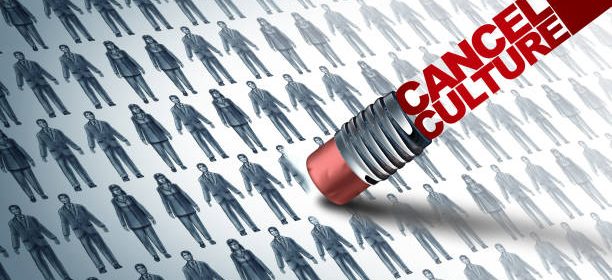Opinion: Social Media is Overrun by Cancel Culture

Cancel culture is harsh, and it has become a negative trend in society through the influence of social media. I would go as far to say that it is a toxic concept and reaps more harm than good.
The concept of cancel culture deals with “canceling” public figures, brands or individuals that have done or said something offensive or deemed wrong by society. Cancel culture is thriving in this season of life and has surfaced on almost every social media platform in some way.
As it is most notably seen on social media platforms, the temptation to jump on the bandwagon of group shaming has become much easier. After all, someone who participates in cancel culture can do it through the click of their keyboard or the tap of their phone. This leads to the question of if pointing out the flaws of others is wrong if done behind the mask of social media.
As a Christian, cancel culture is an immediate red flag. By living in a broken world, it is nothing but man’s nature to sin. The bottom line is, people are going to make mistakes in life, as no one is perfect.
However, Christ’s followers must build each other up and not tear each other down. This is the exact opposite of what cancel culture does — it is rooted in evil and not in love.
Romans 12:2 says, “Do not be conformed to this world, but be transformed by the renewal of your mind, that by testing you may discern what is the will of God, what is good and acceptable and perfect.”
When I read this verse, it reminds me to lift my eyes off the corruption of man and instead focus on the perfection of the Creator. Where cancel culture screams, “your past defines you,” God declares that we are forgiven and made new through him.
Digging up the past of public figures or brands and using it to manipulate the public against them is wrong. It is unfair to shame others of their past if one neglects to acknowledge their own. There is no room for growth in this
circulating trend.
When I think of a brand that has been subjected to being “canceled” this year, I immediately think of Quaker Oats Company discontinuing Aunt Jemima. Aunt Jemima was a line of breakfast, pancake and syrup products. However, the brand itself was discontinued to suppress racial stereotypes.
Other brands such as Land O’ Lakes have been put in the spotlight to rebrand as the media strives to cancel anything that can be considered controversial. After 92 years with the same logo, Land O’ Lakes caved to the pressure to remove the photo of the Native American woman who has appeared on their products since 1928. In return, it forces the brand or person to conform to something or someone that meets the current standards of society.
Overall, 2020 has been and still is a year full of division and controversy as cancel culture continues to thrive on social media and even in the work place.
What if cancel culture was “canceled” instead of those affected by it? What if we spent more time supporting and encouraging people instead of destroying their reputation?
A world without cancel culture would be a world with more love to give and less hate to receive.
Lauren Shank is an Opinion Writer.

Cannot agree with this more! Lovely writing
Very well said and so very true. Thank you.
Thank you for sharing your opinion on the matter but I do not necessarily agree. Without what has now become known as ‘cancel culture’ those in power and those with authority are free to wrong others. What you call ‘cancel culture’ is just these people being made to face consequences for their actions or to face some criticism.
Writing cancel culture off as nothing but irrational mob mentality undermines the feelings and wellbeing of disenfranchised groups. Yes, the people who do the wrong should be allowed to grow and repent, with this I agree with you, but it is up to those who they have wronged to decide whether or not to forgive them.
I disagree. There are no systems in place to regulate cancel culture and it always turns into abuse and harassment with no forgiveness. The internet is ruthless and for some who are sensitive to it become depressed, insecure, and often suicidal. I think cancelling big brands such at Aunt Jemima and Land O’ Lakes is ok because it’s attacking a larger social injustice, I think it’s being sensitive in my opinion, but that’s can be debated.
I’m new to this subject, so I may mistake in commenting.
At first glance, it seems to me a wholesome and thoughtful thing to drop from our current culture sports team names that demean groups of people; words and that are offensive (the ‘n’ word for starters), flags, statues of historical persons and other such things that time has shown to be discreditable to our nation’s history.
Please, someone who is thoughtful about what the word “freedom” means when interests collide, explain why stuff that honors or tacitly accepts the social garbage of yesteryear should be not be tossed aside from today’s world.
What would Jesus say to someone hurt by such old cultural items? “Oh, don’t be so sensitive?”